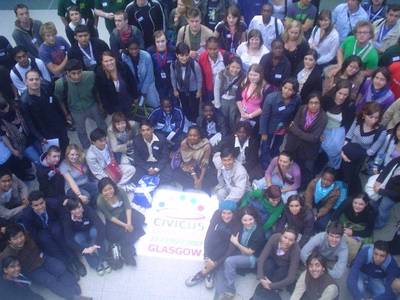The idea that there is one 'voice of youth' is clearly nonsense. Yet this idea underlies many invitations to a small group of young people to participate in comittees and to 'represent the voice of youth' in those settings. Nevertheless, whilst there is no one 'voice of youth', that doesn't make it illegitimate for groups of young people to speak with one voice – and to make calls on behalf of their fellow young people.
Roger Schmidt has just added this this comment to my post reviewing the Civicus World Assembly 2007. The Civicus World Assembly included, for the first time this year, a youth assembly – which, as this post explains led to a 'Call for Intergenerational Collaboration' drafted collaboratively by the young people present. In effect, a youth declaration from the assembly.

Delegates at the 2007 Civicus Youth Assembly
Roger comments:
“…it is right to prepare young people for the participation in larger “adult” assemblies. But it is wrong to have a seperate youth contribution (declaration) or whatever because there can't be a unified youth opinion. Youth in itself is so diverse. I think that is another issue to discuss because it helps to clarify the sometimes conflicting goals of preparation and meaningful contribution.”
I agree with the claim that youth is diverse. Though the same claim can be made of any age grouping. It may be particularly interesting as a claim about young people, given a significant aspect of 'youth' (as a life-stage) is about experimentation with identity and identity formation which, it could be argued, increases the diversity of youth (as a generation). But the argument that diversity precludes collective declarations doesn't neccessarily follow.
Whilst inviting a few individuals to speak as themselves 'with the voice of youth' is flawed, young people often have shared interests: as a group collectively impacted by specific oppressions; as a group affected by age-related laws; and as those who will see the impact of decisions far beyond the time-horizons of most adult decision makers. And those shared interests can ground a specific youth contribution to a debate.
It's important that, on these issues of shared interest, young people are allowed to represent their claims as 'a voice of youth' (note, not 'the voice of youth', and not 'a voice of a young person'). Declarations that call for action from a collective young peoples perspective are a core part of forming political movements of young people to create change.
In conclusion
Individual young people claiming to speak with the voice of youth does not make sense.
Inviting a few young people to give their opinion on some issue which clearly affects different young people differently cannot be called listening to the voice of youth (it is listening to the specific views of some young people).
But where shared interests exist, and where a suitably large and diverse group of young people come together to discuss those shared interest and to articulate them, a declaration can be made as a voice of youth, and significant weight should be given to that declaration or call.
Quick reader question:
On topic: I've tried to untangle what I think are common confusions with respect to the idea of 'a voice of youth'. Does this work? Do you agree?
Meta-question: Are these 'philosophical' posts of interest? Should I just try and write up the conclusions… or is the reasoning of interest (this is already a heavily edited down version of what I first wrote…)?